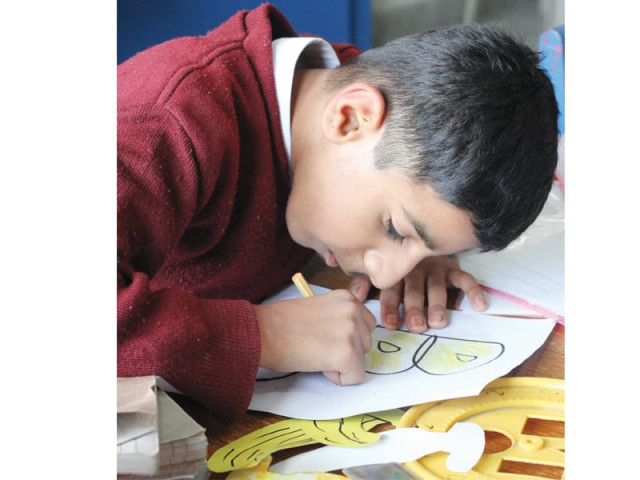Training centre helps people with cognitive disabilities prove they can hold jobs too
So far, Karachi Vocational Training Centre has found jobs for more than 450 trainees.

The institute’s students are hard workers. During class, Shabbir colours a picture of fruits. PHOTO: AYESHA MIR/EXPRESS
For Mumtaz Rafiq, who is one such child, enrolling at the Karachi Vocational Training Centre (KVTC) 14 years ago was a life-changing decision. After two years of culinary training, he got a job at a fast-food chain and now earns Rs14,000 a month.
The centre, located in Phase IV, DHA, focuses on providing vocational training to people with cognitive disabilities. “It started off with a promise - to aim for something greater than the simple rehabilitation of totally neglected members of society. Slowly, people with similar goals started joining the initiative,” said Imran Sohail, who is a speech therapy specialist at the centre and develops the curriculum for children with cognitive disabilities. “We shattered the myth that children with cognitive disabilities cannot learn, hold jobs, earn livelihoods and live independently.”
Since its creation in 1991, the institution has opened its doors to children who are at least 12 years old. It provides them with self-grooming, social and vocational skills as well as health and safety training, said Amir Shahab, the institution’s operations manager. The institution currently has the capacity to train a batch of 140 students. The vocational training includes tailoring, block-printing, cooking as well as arts and crafts.
In order to achieve this, individualised study plans catering to each student are devised during the orientation sessions. Parents are also asked to submit reports about their children’s behaviour at home.
Facilities at the centre
The centre has a workshop where students, who still require supervision even after training, can earn some money. Through various companies, the institution acquires projects involving tasks such as packaging. Students work on these tasks and earn between Rs3,000 and Rs5,000 every month. “There are days when we do not get any work and the students seem upset,” said their trainer, Najia Naz.
The institution found regular jobs for more than 450 trainees, including 17 managerial positions.
A Montessori was also set up with the support of HSBC Bank, which donated Rs1.1 million. “The Montessori enabled us to cut the time to achieve our six-month goal of abstract learning by half,” said Shahab. He hoped that more donations would roll in soon so that the Montessori could be expanded.
Need for more centres
While regular schools have mushroomed across the city over the years, KVTC - with its band of 70 devoted trainers - remains the premier institution which provides vocational training to children with learning difficulties.
Though reliable statistics are not available, Shahab estimated that around 600,000 people with cognitive disabilities live in Karachi and only 32 institutions have been set up for them. The institutions cater to the needs of roughly 10,000 people.
At the KVTC, over 1,900 children await admission because of a lack of space and paucity of funds. “There are still a few committed people and that is why the institution is still running,” said the principal. “Perhaps our society is not mature enough to treat people with cognitive disabilities the way they deserve to be.”
Published in The Express Tribune, February 26th, 2013.



















COMMENTS
Comments are moderated and generally will be posted if they are on-topic and not abusive.
For more information, please see our Comments FAQ